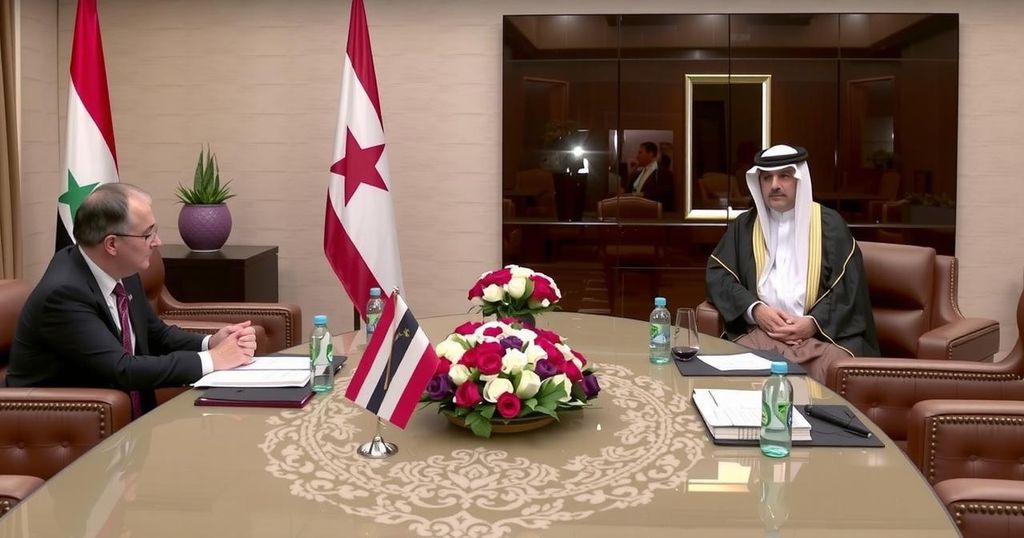Syria’s newly appointed Foreign Minister Asaad al-Shibani met with Qatari leaders to discuss establishing diplomatic ties, aiming to lift sanctions and revitalize the economy under HTS leadership after the ousting of President Bashar Assad. Further conversations with regional counterparts, including Saudi Arabia and nations in the UAE, are planned to enhance strategic partnerships despite uncertainties regarding the lifting of international sanctions.
On January 5, 2025, Syria’s newly appointed Foreign Minister, Asaad al-Shibani, engaged in diplomatic discussions in Doha with Qatar’s Prime Minister and his Qatari counterpart. This meeting is part of efforts by the new authorities in Syria, specifically under Hayat Tahrir al-Sham (HTS), to establish ties with international governments. Al-Shibani revealed plans to further strengthen relations with Jordan and the United Arab Emirates, focusing on strategic partnerships aimed at revitalizing Syria’s economy and enhancing security.
Previously, Al-Shibani had discussions in Riyadh with his Saudi counterpart and hosted foreign ministers from Germany and France in Damascus. HTS, which recently emerged as the dominant power following its successful insurgency that culminated in the downfall of President Bashar Assad, now seeks to reintegrate Syria into the global community after years of isolation due to the brutal civil war.
The insurgency, which resulted in the loss of approximately 500,000 lives since 2011, led to the breakdown of diplomatic relations internationally due to Assad’s severe crackdown on dissent. Under the Islamist leadership of HTS, there is a concerted effort to lift sanctions and recover economic viability. Al-Shibani articulated concerns over economic sanctions hindering the well-being of Syrian citizens, noting that 90% of the population lives in poverty, which prompts calls for the United States to reconsider its sanctions strategy.
During a forthcoming national dialogue summit, Al-Sharaa, another prominent leader within HTS, has proposed a political roadmap aimed at drafting a new constitution and facilitating elections. He has vowed to dissolve HTS as part of this effort, indicating a shift in governance as the group attempts to consolidate its political narrative. Despite these aspirations, there remain significant uncertainties regarding the willingness of Western nations to lift sanctions, particularly in consideration of human rights conditions and the treatment of minority groups and women in the new governance framework.
Ultimately, while there are steps being taken towards regional re-engagement and economic recovery for Syria under HTS, the path forward remains fraught with challenges, and the international community’s response will be crucial to determining the nation’s future trajectory.
The current landscape of Syrian politics is fundamentally changing following the ousting of long-time President Bashar Assad by HTS on December 8, 2024. HTS emerged as a leading authority in Syria amid ongoing civil strife, which has devastated the country and resulted in countless humanitarian crises. The prioritization of establishing diplomatic ties is aimed at alleviating the economic crisis, characterized by widespread poverty and food insecurity for the Syrian populace. Previous diplomatic efforts had been severed due to global sanctions imposed on Assad’s regime, and HTS is now seeking to form new alliances and expedite international recognition.
In summary, Syria’s new Foreign Minister is actively pursuing diplomatic engagements with various nations as part of HTS’s strategy to forge relationships that could support Syria’s recovery efforts. The aspirations of HTS to dissolve itself as part of the political transition reflect a potential shift towards a more inclusive governance model; however, significant hurdles remain, particularly concerning international sanctions and the scrutiny regarding human rights. The willingness of global powers to engage diplomatically will play a pivotal role in shaping Syria’s future.
Original Source: www.thehindu.com






